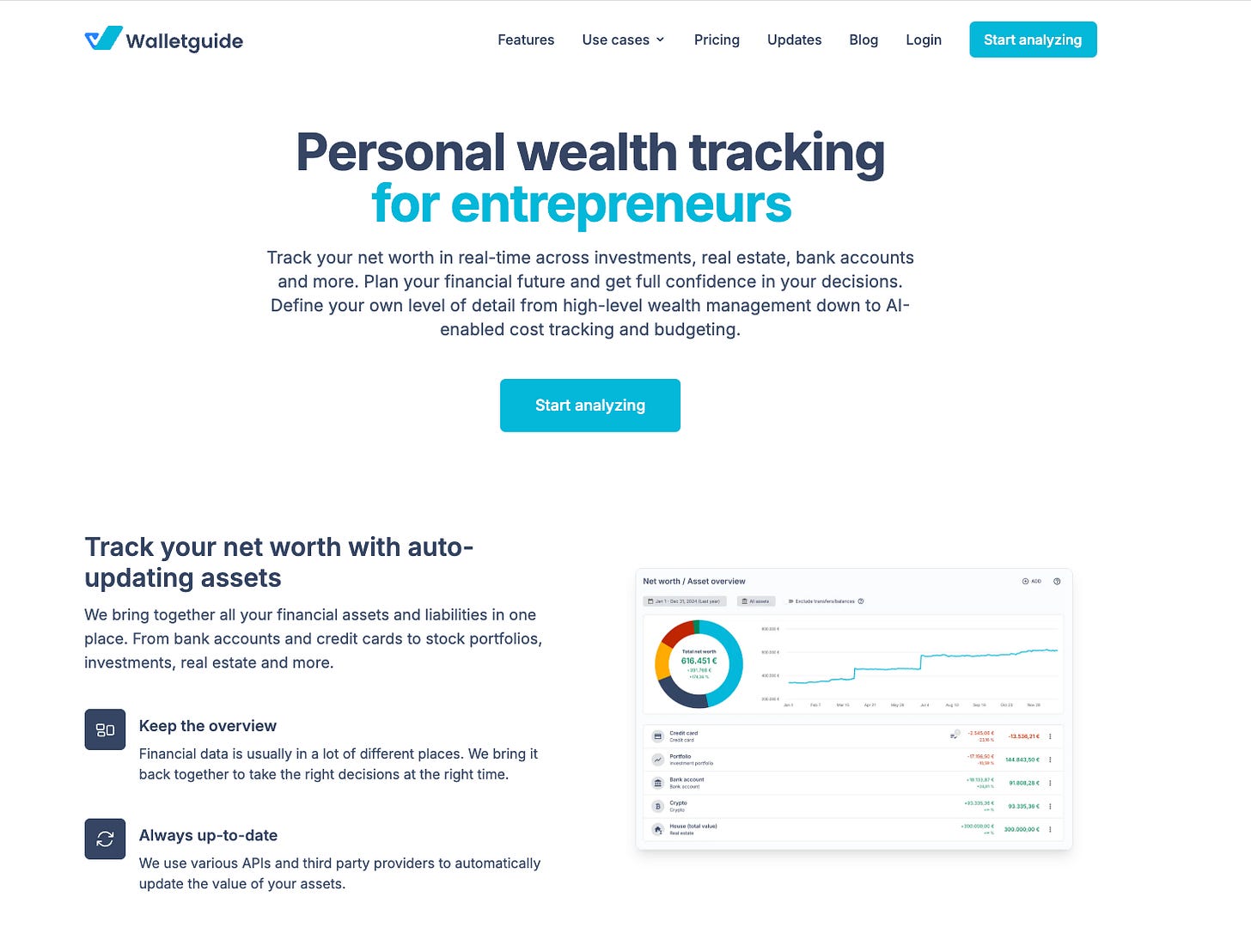Alexander Peiniger of Walletguide: From SaaS Exit to Personal Finance App
Volume #11 of "Happy Bootstrapping" Newsletter
Alexander Peiniger sold his first company Quintly in 2022 after 12 years of successful growth. Instead of retiring, the 41-year-old from Düsseldorf started a new bootstrapping adventure together with his brother: Walletguide, a platform for personal wealth tracking that aims to simplify complex wealth management. With his second venture, Alex wants to prove that successful entrepreneurship is possible even with work-life balance.
This is a summary of Episode 122 of the “Happy Bootstrapping” Podcast (German)
From Social Media Analytics to Personal Finance
Alex's entrepreneurial journey began in 2007 with an agency for Facebook apps. A customer request led to the idea for Quintly (originally "Social Media Tracking") in 2010, a B2B SaaS solution for social media analytics. After a strategic partnership with a US investor and later buyback of shares, Quintly developed into a profitable company with low seven-figure annual revenue and customers from nearly 50 countries.
"The biggest difference for us was actually that we, as tech founders, sat down and really did sales all day long. That made the difference between 1% monthly growth and 10% monthly growth."
The turning point came in 2018 with the Cambridge Analytica crisis, which resulted in massive API changes at Facebook. Combined with internal growth pains, this led to revenue declines. After a phase of consolidation and team downsizing, Alex and his brother managed to make the company profitable again before selling it to the Facelift/DuMont Group in 2022.
Walletguide: The Vision of Holistic Wealth Overview
Parallel to the sales process, the idea for Walletguide emerged in 2020 as a side project. The personal finance tool targets a specific audience: entrepreneurs, business angels, and freelancers with complex wealth structures who previously relied on Excel spreadsheets.
"The idea was actually, okay, why don't we pour this into software that is flexible enough to cover the cases that would otherwise be in a spreadsheet. But with usability that has modern design."
The business model is based on two pricing tiers: €10 monthly for the entry plan with one wallet and 10 assets, and €29 for extended features. Currently, Alex and his brother have about 10-20 paying users in the early product-market fit phase.
Alex defines 100 users with a retention rate of over 80 percent as success criteria.
Technology and Marketing in the AI Era
Technically, Walletguide uses a modern stack: TypeScript for frontend and backend, React, Google Cloud with Firebase. Development benefits greatly from AI tools like Cursor, making Alex three to five times faster at programming than before. For APIs (banks, stock quotes, real estate valuations), the team invests about €600 monthly.
"Actually, all new features we first put into AI and see how far it gets. Then we do the patchwork in between what didn't work."
Marketing is more challenging than in the B2B space. Alex focuses on content marketing, LinkedIn, and direct customer feedback. Word-of-mouth is currently the most important acquisition channel. The international orientation (completely in English) follows Quintly's proven strategy.
Bootstrapping Challenges and Learnings
As a second-time founder after a successful exit, Alex faces new challenges: Less time pressure also means less urgency. With family and changed priorities, the team consciously works on a more sustainable work-life balance – about 80% working time with regular hours instead of the previous 16-hour days.
Alex's key learnings for founders:
Take sales seriously as a tech founder: Direct customer contact is crucial for product-market fit
Trust your gut feeling: All decisions made too late were already in the gut feeling half a year earlier
Think long-term: No short-term optimizations at the expense of sustainable development
Focus on retention: Without at least 80% net retention, bootstrap SaaS is hardly profitable
By the end of 2025, Alex wants to have proven product-market fit. If successful, nothing stands in the way of building a small team – this time with the experience of an exit-experienced founder who wants to prove that successful entrepreneurship and family are compatible.
Happy Bootstrapping is a German podcast where I interview bootstrapped founders, indie hackers, and solopreneurs about their startup journeys. Over the years, I've connected with many successful entrepreneurs who have built e-commerce shops, SaaS platforms, mobile apps, content businesses, or hybrid models.
Furthermore I am a bootstrapper myself and growing my DevOps-as-a-Sercice and Web Operations Company “We Manage”.




